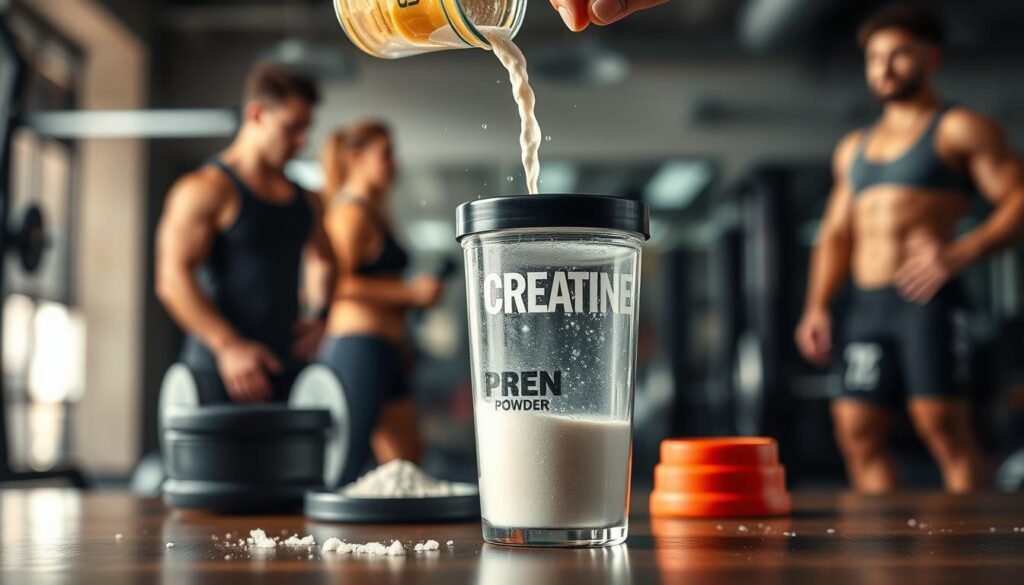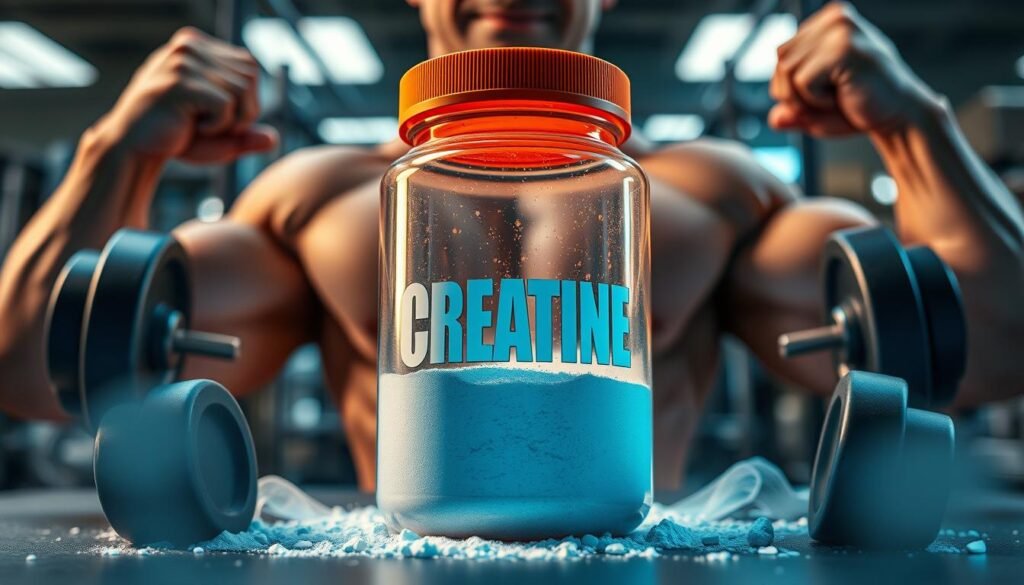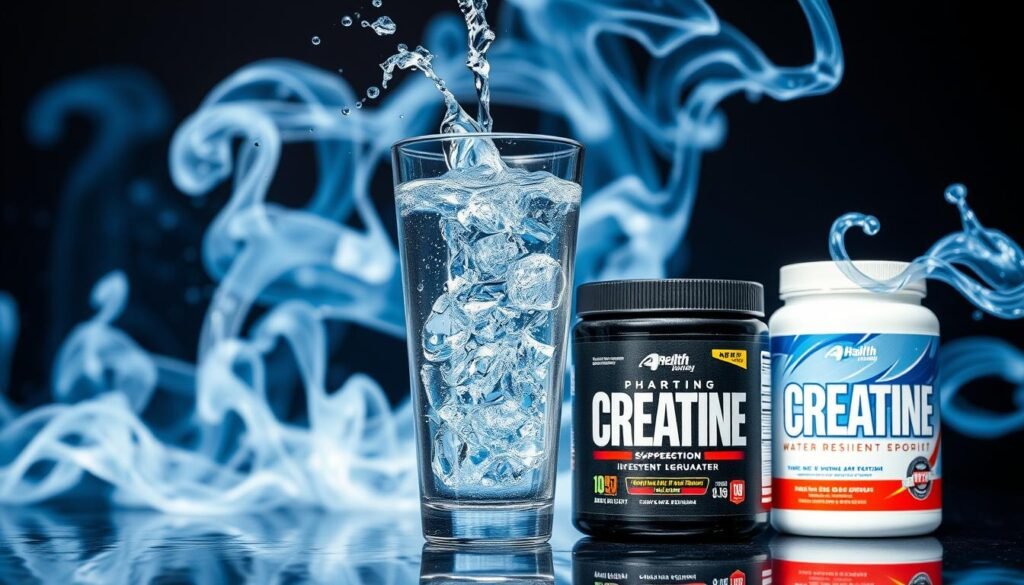If you’re into fitness, you’ve probably heard about creatine. It’s a top choice for bodybuilders. It boosts strength, muscle growth, and athletic performance. But, you might wonder, “Does it make you gain weight?” This is a big question for those thinking about trying creatine.
In the U.S., millions of dollars are spent on creatine each year. It’s a big deal in the sports world. High school, college, and pro athletes use it a lot. Especially in sports like football, hockey, wrestling, and gymnastics.

At first, creatine might make you weigh a bit more (2-4.5 pounds). But most of this is water, not fat. Creatine is well-studied and is seen as safe and effective
Table of Contents
Understanding Creatine and Its Effects on the Body
Creatine is a natural substance in muscle cells, made from amino acids like arginine and glycine. It’s key for energy, especially during intense activities. Knowing how creatine works helps decide if supplements are good for you.
What is Creatine?
Creatine is made in the body from amino acids and stored in muscles. It’s also in foods like meat, fish, and eggs. Athletes and fitness fans take creatine supplements to boost performance and build muscle.
How Does Creatine Work in the Body?
Creatine boosts ATP, the main energy for muscles during hard exercise. Taking creatine increases phosphocreatine, leading to more ATP and better performance. Studies show creatine can improve exercise capacity by 5% to 10%.
Creatine also helps muscles grow and work better. It stops muscle breakdown, keeps muscles hydrated, and boosts strength and mass. A 2017 study found creatine users gained 3 pounds (1.4 kg) more muscle than those without it.
| Creatine Benefit | Description |
|---|---|
| Increased ATP Production | Creatine enhances ATP levels, providing energy for high-intensity activities |
| Muscle Growth and Strength | Creatine promotes muscle fiber growth, reduces protein breakdown, and increases muscle hydration |
| Improved Exercise Performance | Creatine supplementation can increase exercise performance capacity by 5% to 10% |
| Cognitive Benefits | Creatine may help reduce mental fatigue, improve cognition, and enhance memory |
Creatine also benefits the brain. A 2021 review found it can lessen mental fatigue, improve thinking, and boost memory by increasing brain ATP.
The Relationship Between Creatine and Weight Gain
Creatine supplements can make you gain weight, but it’s important to know why. The main reasons are water retention and an increase in muscle mass.

Water Retention and Creatine Supplementation
Creatine pulls water into your muscles. This can cause a quick weight gain of 2-4 pounds in the first week. This is mostly water in your muscles.
During the creatine loading phase, you might gain even more water. But don’t worry, this extra water goes away once you stop taking creatine.
Muscle Mass Increase and Creatine
Creatine helps your muscles grow by signaling important pathways and boosting your workouts. It takes 2-4 weeks to see muscle gains, and even more after 6-8 weeks.
| Duration of Creatine Use | Effect on Muscle Mass |
|---|---|
| 2-4 weeks | Initial increase in muscle mass and strength |
| 6-8 weeks | Significant gains in muscle mass and strength |
More muscle mass from creatine means you might gain weight. But creatine doesn’t make you fatter. In fact, it might help you lose body fat because it makes your workouts better.
Does Creatine Make You Gain Weight?
Creatine is popular among athletes and fitness fans for boosting performance and muscle. But, many wonder if it causes weight gain. Yes, creatine can lead to weight gain, but it’s not all bad.
Starting creatine, especially during the loading phase, can quickly add 2-4.5 pounds. This weight gain is mostly water in your muscles. Creatine pulls water into muscle cells, making them swell and look bigger. This water is only in the muscles, not all over your body.

The water weight from creatine is temporary. Stopping creatine or lowering your dose will make the weight go back to normal. So, the weight gain from creatine isn’t permanent and can be undone.
Creatine also helps with weight gain through muscle growth. It lets you work out harder, which can make your muscles bigger. This kind of weight gain is good for those wanting to get stronger and look better.
Don’t think creatine makes you fat. Creatine itself has no calories and doesn’t add to fat storage. But, eating more calories than you burn while taking creatine can lead to weight gain. To avoid unwanted weight, eat well and exercise regularly.
Creatine and Water Weight Gain
Starting creatine supplements can make you feel heavier. This is because your muscles hold more water, causing weight gain. The amount of weight gained can vary, but it’s usually between 2 to 4.5 pounds.

This weight gain is not permanent. It goes away once you stop taking creatine. Some people might feel bloated or puffy at first. But, staying hydrated and managing your dosage can help.
How Much Water Weight Can You Gain from Creatine?
During the creatine loading phase, you take 20-25 grams daily for 5-7 days. This can make you gain 1-2% of your body weight, mostly water. It can also increase your muscle creatine by up to 40%.
The usual creatine dosage is 3 to 5 grams a day. It’s important to take it carefully and drink plenty of water. Aim for 8-10 glasses a day for best results.
Is Water Weight Gain from Creatine Permanent?
The water retention from creatine goes away a few weeks after stopping the loading phase. Starting with a maintenance dose of 3-5 grams daily can help avoid bloating.
Creatine monohydrate is better for reducing water retention than other types. Remember, the weight gain from creatine is mostly water and muscle hydration, not fat.
| Creatine Dosage | Water Weight Gain | Duration |
|---|---|---|
| Loading phase: 20-25 grams daily for 5-7 days | 1-2% of body mass | Temporary, resolves after a few weeks |
| Maintenance dose: 3-5 grams daily | Less significant | Varies among individuals |
Creatine and Muscle Mass Gains
Creatine is a popular supplement known for boosting muscle mass. It changes how cells grow, making muscles bigger. It also increases a hormone called IGF-1, which helps muscles grow.
When you take creatine and lift weights, you see bigger muscles and more lean body weight. This is because creatine helps your body make more energy during workouts.

Research shows creatine makes you weigh more, but it’s mostly water in muscles. This extra weight is from muscles, not fat. So, it’s not just water that’s making you heavier.
But, creatine isn’t all bad. It can help you perform better, build more muscle, and recover faster. It might even improve your blood health and help with Parkinson’s symptoms.
| Benefit | Description |
|---|---|
| Increased muscle mass | Creatine supplementation can lead to significant increases in lean body weight and muscle size when combined with resistance training. |
| Enhanced athletic performance | Creatine increases the body’s production of phosphocreatine, which provides energy during physical exertion, leading to improved endurance and faster recovery between workouts. |
| Potential cognitive benefits | Studies suggest that creatine may have cognitive benefits for those with brain injuries, such as concussion. |
Even though creatine is safe, talk to a doctor before using it. There are many types and amounts of creatine out there. A doctor can help you choose the right one for you.
Creatine and Fat Gain: Separating Fact from Fiction
Many people think creatine causes fat gain. But, science doesn’t back this up. In fact, creatine can help improve your body’s shape when you eat right and exercise.
Does Creatine Cause Fat Gain?
Creatine doesn’t directly cause fat gain. Studies show it can help you lose more body fat than just working out. This is because it makes your workouts better, helping your body get in shape over time.
At first, creatine might make you feel a bit more waterlogged. But this isn’t fat. The extra water is mostly in your muscles, not fat. Research confirms that creatine doesn’t increase your body’s water content in just a few weeks.
The Role of Diet and Exercise in Body Composition
While creatine is helpful, diet and exercise are key to your body’s shape. Think of creatine as a supplement, not a replacement for good eating and working out.
| Factor | Impact on Body Composition |
|---|---|
| Diet | A balanced, calorie-controlled diet is essential for managing weight and optimizing body composition. |
| Exercise | Regular resistance training and cardiovascular exercise help build lean muscle mass and reduce body fat. |
| Creatine Supplementation | When combined with a proper diet and exercise program, creatine can enhance muscle mass gains and improve overall body composition. |
To get the most from creatine, keep exercising regularly and eat well. Focus on these basics to improve your body without worrying about fat gain.
How to Minimize Water Retention When Taking Creatine
If you’re worried about water retention from creatine, there are ways to lessen it. Some bloating happens during the loading phase, but it’s usually short-lived. Making a few diet and lifestyle changes can help manage it.
Adjusting Your Sodium and Carbohydrate Intake
To cut down on water retention, try reducing sodium. Processed foods are often high in sodium. Eating less of these foods can help. Also, controlling your carb intake can reduce water retention. Here are some tips:
- Choose fresh, whole foods over processed options
- Read nutrition labels to monitor sodium content
- Opt for complex carbohydrates like whole grains, fruits, and vegetables
- Avoid excessive consumption of simple carbs like sugary snacks and drinks
Staying Hydrated and Exercising Regularly
It might seem odd, but drinking plenty of water is key when taking creatine. Aim for 8-10 glasses a day to help get rid of excess water and reduce bloating. Regular exercise also helps shed water weight and improve your body’s shape. Consider the following:
| Strategy | Benefit |
|---|---|
| Drink 8-10 glasses of water daily | Flushes out excess water and reduces bloating |
| Engage in regular exercise | Helps shed water weight and improves body composition |
| Opt for creatine monohydrate | Considered the most effective form of supplemental creatine |
| Skip the loading phase | Reduces the likelihood of experiencing bloating and water retention |
By using these strategies and watching your creatine intake, you can reduce water retention. This way, you can enjoy the benefits of creatine without the unwanted side effects.
Creatine Side Effects and Safety Concerns
While creatine is seen as a safe supplement, knowing about possible side effects is key. It’s usually taken in doses of 5-10g daily. Studies over 200 years show it’s safe for healthy people.
Some people say creatine can cause muscle cramps or dehydration. But, studies haven’t backed up these claims. A study with 18 men found no harm to their health after seven days of taking creatine.
Even though creatine is mostly safe, it’s good to know about possible side effects. These can include:
- Muscle cramping
- Dehydration
- Diarrhea
- Nausea
- Seizures (in rare cases)
Many people gain about five pounds while using creatine. This is mostly water weight in muscles. It’s not fat.
| Reported Side Effect | Clinical Evidence |
|---|---|
| Muscle injuries | Not supported |
| Hair loss | Not supported |
| Acne | Not supported |
| Weight gain | Consistent, attributed to muscle mass or water retention |
People with kidney disease should be careful with creatine. It might raise creatinine levels in the blood. There’s also not enough research on its safety for pregnant or breastfeeding women.
Before starting creatine, it’s wise to talk to a doctor. Stick to the recommended dose and be careful with other substances. Also, choose products from reputable sources since the supplement industry isn’t heavily regulated.
Despite some concerns, creatine is still popular among athletes and gym-goers. It’s not banned by the International Olympic Committee or NCAA. Still, it’s best to pick a certified product for safety.
The Benefits of Creatine Supplementation for Athletic Performance
Creatine is a well-known supplement that boosts athletic performance. It helps the body make ATP, the main energy source for cells. This leads to better strength, power, and endurance, and less fatigue.
A study in Nutrients looked at 16 clinical trials. It found that creatine boosts muscle strength in young adults doing resistance training. It also helps males gain more lean body mass than females when training.
Increased Strength and Power Output
Creatine is great for sports needing quick, intense efforts. This includes weightlifting, football, and swimming. It’s especially good for short, high-intensity exercises, not long ones.
Enhanced Endurance and Recovery
Creatine also helps with recovery and improves muscle performance. It can reduce muscle damage and inflammation after exercise. This makes it easier to recover and train again.
To keep creatine levels up, take 1–3 grams daily. Some athletes use loading doses for quick gains. Creatine monohydrate is the most studied and effective form.
Conclusion
Creatine is a safe and effective supplement for athletes and health enthusiasts. It can lead to weight gain, but this is mostly water in the muscles, not fat. The weight gain is usually small, between 2 to 4.5 pounds, and happens mainly when you first start taking it.
Creatine Monohydrate is the most studied and used form of creatine. It’s safe and boosts muscle creatine levels. This helps muscles grow by pulling water into them. Creatine HCI is another form that might cause less water retention and weight gain. But, more research is needed to confirm this.
Adding creatine to a balanced diet and exercise routine can be beneficial. It can increase strength, power, endurance, and recovery. Knowing how creatine affects weight and its benefits and safety can help you decide if it’s right for your fitness goals.
FAQ
What is creatine, and how does it work in the body?
Creatine is a natural amino acid found mainly in muscles. It helps make ATP, the energy for muscles. Taking creatine boosts phosphocreatine, leading to more ATP and better performance in intense workouts.
Does creatine make you gain weight?
Yes, creatine can make you gain a little weight, about 2-4.5 pounds. This usually happens in the first week, known as the loading phase. Most of this weight is water, not fat.
How much water weight can you gain from creatine, and is it permanent?
Creatine can make you retain more water, leading to weight gain. The amount varies but is usually 2 to 4.5 pounds. This extra water is not permanent and goes away when you stop taking creatine.
Can creatine help increase muscle mass?
Yes, creatine is great for building muscle. It changes how muscles grow, increases protein, and boosts IGF-1, a hormone for muscle growth.
Does creatine cause fat gain?
No, creatine does not cause fat gain. In fact, it can help reduce body fat and increase muscle when used with a healthy diet and exercise.
How can I minimize water retention when taking creatine?
To reduce water retention, adjust your sodium and carb intake. Drink plenty of water and exercise regularly to lose excess water.
Is creatine safe, and what are the potential side effects?
Creatine is very safe, with few side effects at the usual dose (5-10g daily). Some people might experience mild muscle cramps or dehydration, but studies don’t confirm these.
What are the benefits of creatine supplementation for athletic performance?
Creatine boosts athletic performance in many exercises. It increases ATP production, leading to better strength, power, and endurance. It also helps with recovery by reducing muscle damage and inflammation.
How Was Your Experience? Share Your Review!
There are no reviews yet. Be the first one to write one.

